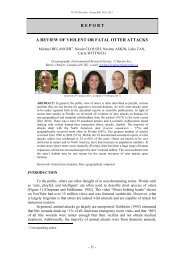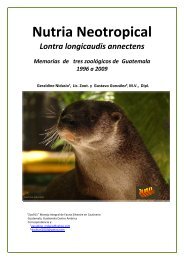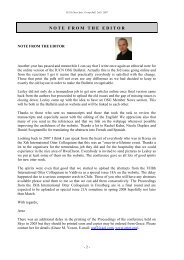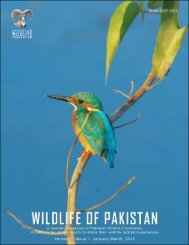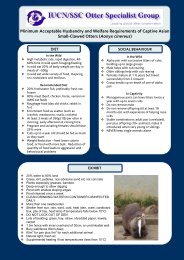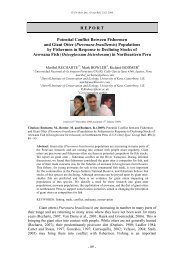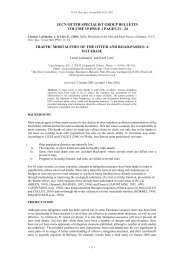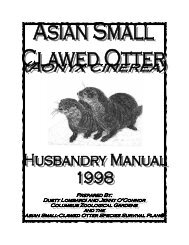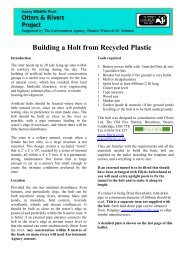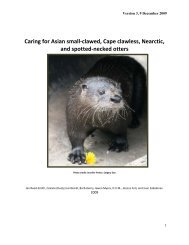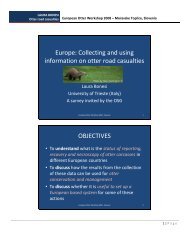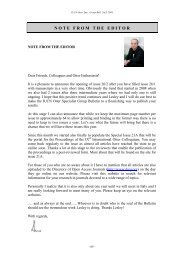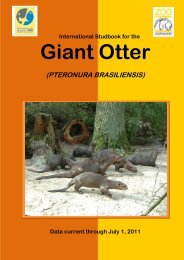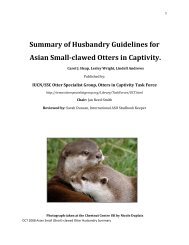International Giant Otter Studbook Husbandry and Management
International Giant Otter Studbook Husbandry and Management
International Giant Otter Studbook Husbandry and Management
Create successful ePaper yourself
Turn your PDF publications into a flip-book with our unique Google optimized e-Paper software.
weak, underdeveloped cubs, or cubs introduced to a new formula or that are new to nursing<br />
from artificial apparatuses, may not eat as much as healthy cubs (e.g. 10%-12% of their body<br />
weight per 24 hours). In these cases, smaller intake amounts are acceptable for a time or until<br />
the animal’s health improves, but eventually <strong>and</strong> gradually recommended amounts should be<br />
offered according to toleration. A cub should never be forced to eat; instead, the problem,<br />
which is causing the cub’s lack of appetite, must be solved. Cubs will fluctuate somewhat in<br />
the amounts they eat daily which is normal. Some cubs, when they are healthy, may naturally<br />
eat somewhat less than 20% of their body weight daily. Other cubs may eat/need more than<br />
20% <strong>and</strong> even up to 30% of their body weight per day, although intake should be carefully<br />
monitored <strong>and</strong> restricted if necessary.<br />
“Most animals learn to anticipate their feeding times <strong>and</strong> may wake up, become more active or<br />
restless, <strong>and</strong> cry or call just prior to feeding time. Nursery staff should monitor this behavior so<br />
it can be used to evaluate the development <strong>and</strong> health status of the youngster.” (Read & Meier<br />
1996). If cubs seem overly or continually hungry (e.g. continually crying for food in<br />
between or just after feeds) or are excessively anticipatory prior to feedings this can<br />
indicate problems exist with cub health or the formula offered. For example, the formula<br />
may be too weak or inappropriate to supply adequate energy or nutrition etc.. As well if cubs<br />
show a lack of appetite or decreasing appetite they may have health problems or they may not<br />
like the formula being offered.<br />
Very young, newborn, <strong>and</strong>/or sick weak cubs (at older ages) must be fed at least every 2 to<br />
3 hours around the clock. (Burnette 1994). It is preferable to feed these cubs at least<br />
every 2 hours throughout the day <strong>and</strong> night (e.g. 6 a.m. to 12:01 a.m.) <strong>and</strong> at least every 2-<br />
3 hours overnight. Young cubs that are sick may need feedings as often as every 1 to 1½<br />
hours around the clock. Healthy young cubs that are at least 2 weeks or older should be<br />
fed at least every 3 hours throughout the day <strong>and</strong> night <strong>and</strong> every 3-4 hours overnight.<br />
Some institutions feed healthy otter neonates every hour during the day <strong>and</strong> every 2 hours<br />
during the night (e.g. Smeeton 2001). As the otters increase the amount they eat, the feedings<br />
are reduced, but they are still fed every 3 hours around the clock until they are at least 6 weeks<br />
old. As the cub grows older, <strong>and</strong> depending on its physical condition/state of health, the<br />
number of feedings can be gradually reduced <strong>and</strong> overnight feedings can be gradually<br />
eliminated. For example, healthy 2 month old cubs should be fed at least 6 times throughout<br />
the day <strong>and</strong> evening or fed every 3 hours from 7 a.m. to 10 p.m., <strong>and</strong> the overnight feeds can be<br />
gradually eliminated. Four month old cubs should be fed a minimum of 5 times throughout the<br />
day <strong>and</strong> evening or every 4 hours throughout the day <strong>and</strong> evening. Some h<strong>and</strong>rearers have fed 4<br />
month old giant otter cubs 7 times per day <strong>and</strong> 5 month old cubs 6 times per day. It is optimal<br />
to feed animals that are 6 months old at least 4 to 5 times per day <strong>and</strong> continue with at least 3 to<br />
5 feedings per day in their sub-adult <strong>and</strong> adult life.<br />
It is very important that all reductions in the feeding schedule be done gradually (spread<br />
out over a period of time). If cubs become very hungry <strong>and</strong> frustrated in-between scheduled<br />
feedings (before feeding schedules are adjusted to) they should be fed on dem<strong>and</strong> <strong>and</strong> your<br />
schedule should be adjusted to their needs (i.e. feed more frequently <strong>and</strong> in smaller amounts).<br />
When cubs are switched from one milk replacer to another or from mother’s milk to a<br />
milk replacer, the new milk replacer formula should be slowly introduced over a 2-day<br />
period or spread throughout at least several or more feedings (see Section 7). The total<br />
daily amount of food should be divided into the number of feeds suggested below. I.e. for these<br />
purposes, the schedule below is somewhat different than the normal feeding schedule<br />
240



